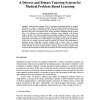Free Online Productivity Tools
i2Speak
i2Symbol
i2OCR
iTex2Img
iWeb2Print
iWeb2Shot
i2Type
iPdf2Split
iPdf2Merge
i2Bopomofo
i2Arabic
i2Style
i2Image
i2PDF
iLatex2Rtf
Sci2ools
ICCE
2007
2007
A Diverse and Robust Tutoring System for Medical Problem-Based Learning
: Problem-based learning (PBL) is becoming increasingly popular in medical education as a means of equipping students with the required clinical reasoning skills. However, faculty time is costly and may not be sufficiently available for PBL sessions that demand greater focus and attention from faculty personnel. Intelligent tutoring systems offer a cost effective and viable alternative in helping to train students in the relevant problem domain. Like other knowledge-based systems, intelligent tutoring systems also suffer from issues such as knowledge acquisition bottleneck, limited scope of problem representation and brittleness in understanding and evaluating system input. The objective of this work is to design a tutoring system for medical PBL, which is less burdensome in acquiring system knowledge, provides students with a broad scope of solution representation and is robust in its evaluation of student solutions. We propose the use of the widely available and broad Unified Medical...
| Added | 29 Oct 2010 |
| Updated | 29 Oct 2010 |
| Type | Conference |
| Year | 2007 |
| Where | ICCE |
| Authors | Hameedullah Kazi |
Comments (0)

